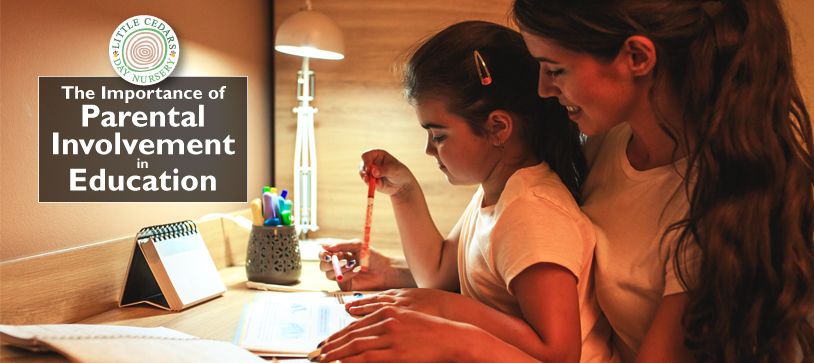The Importance of Parental Involvement in Education

It has long been accepted that the involvement of parents in a child’s education and development is incredibly important, with many benefits for the child. It’s even more beneficial when involvement begins in the child’s early years. Helping children right from nursery means that they’re more likely to get their education foundations set up well. For example, a good foundation in reading and writing will help improve just about every other topic of learning going forwards. That’s why, at Little Cedars Nursery in Streatham, we encourage parents to involve themselves in their children’s learning, right from the start.
Parental involvement in education is shown to lead to a more rounded education and better grades overall. An improved comprehension of topics in turn leads to improved outcomes for the children involved. For example, the pupil may end up with a wider choice when it comes to choosing a university. It’s the same for their career path too, like a domino effect, increasing chances of a more successful career. The importance of parental involvement in a child’s education can therefore not be overstated.
“Parental effort is consistently associated with higher levels of achievement, and the magnitude of the effect of parental effort is substantial.” (Conway & Houtenville study, 2008)
“Students with […] parents operating in supportive roles are 52% more likely to enjoy school and get straight A’s than students whose parents are disengaged with what’s going on at school. This is especially the case during the earliest years of schooling, […] when students with active parents are almost twice as likely to succeed.” (Pinantoan, 2013)
Benefits of Parental involvement in education
The benefits of parental involvement in education include:
| Improved focus on school work; | Better social skills; |
| Greater comprehension of topics; | Improved self-esteem; |
| Better grades; | A more positive, optimistic attitude; |
| Enhanced organisation skills; | The child becoming a more confident and rounded individual; |
| A higher level of responsibility in the child; | A stronger bond between parent and child; |
| Lower truancy rates; | Better communication skills; |
| Improved behaviour; | A wider choice of topics being available e.g. when it comes to further education; |
| A greater capacity in the child to keep trying; | Acceptance, potentially, at better university courses; |
| Moral support, making learning more pleasant for the child; | A wider skill set for the child; |
| Encouragement when it’s tough e.g. when tests are near; | Ultimately all of the above can lead to more opportunities for success, for example a better career with higher pay. |
Studies have shown that parental involvement in a child’s education results in benefits regardless of parents’ education levels, their socioeconomic status or ethnic/racial background¹.
“Parental involvement in children’s learning improves children’s morale, attitude, academic achievement in all subjects and promotes better behaviour and social adjustment. It also helps children to be productive, responsible members of society.” (Centre for Child Well-Being, 2010)
How can parents involve themselves in their child’s education?
Parents can involve themselves in their child’s education in a number of ways. Discussing the child’s strengths and weaknesses with teachers and nursery staff is important. Actively engaging with educational settings at parent evenings and by joining school boards is also beneficial. A collaboration between parents and educational settings can lead to measurable improvements in a child’s academic and physical performance.
The educational involvement of parents while at home with their child has an immense, long-term, positive impact.
Parents can help their children educationally in a number of ways. This can include something as simple as proactively listening to their child reading at home. Similarly, helping the child understand and improve in areas where they are struggling at school is of huge benefit. Helping children with homework and encouraging them with sports activities are other great ways to support them.
Educational support from parents can come in many forms. This includes teaching directly, of course, but also mentoring, to support, encourage and inspire the child. Importantly too, parents must ensure that the child has a home environment that facilitates and encourages learning. They should also express high, but realistic, expectations for their child in terms of possible achievements and career paths.
Helping children throughout their school years works best when it’s approached in a natural, caring kind of way rather than enforcing it as a strict ‘discipline’. It could even be thought of as a kind of teamwork, in practice. This approach means that the child is encouraged, not forced. They will genuinely feel helped and given moral support. Home educational help then motivates the child in question, rather than being made to feel like a chore. And, of course, overall comprehension of topics is greatly enhanced when a parent takes their time to explain things in a relaxed home setting.
“When parents come to school regularly, it reinforces the view in the child’s mind that school and home are connected and that school is an integral part of the whole family’s life.” (Mapp K. and Henderson, A., 2002)
Contact Little Cedars Day Nursery to learn more
If you’d like to learn more about how you can support your child through nursery, pre-school and beyond, we’d be delighted to discuss it with you. Your support can hugely improve your child’s potential outcomes. Call us on 020 8677 9675 or come in and see us when the coronavirus crisis is over (arrange an appointment online here) and we can chat it through. We are a nursery and pre-school based at 27 Aldrington Road in Streatham, London SW16 1TU (click the link above to see a location map). We’re ideal for parents looking for nurseries and childcare services near Streatham, Streatham Park, Tooting Bec, Tooting Common, Furzedown and Balham.









